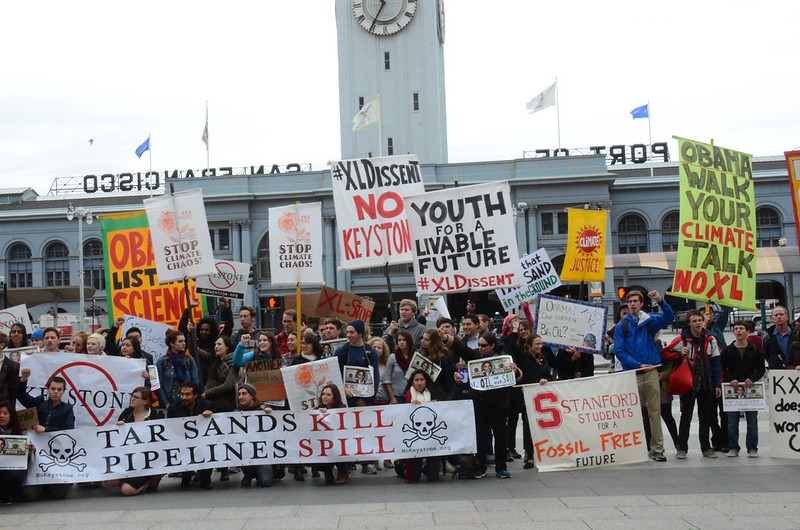On December 7, the Keystone pipeline ruptured, leaking approximately 14,000 barrels (588,000 gallons) of tar-sands oil into Mill Creek in northeastern Kansas, the largest spill in the history of the pipeline. The multi-billion dollar corporation that owns the pipeline, TC Energy and the Environmental Protection Agency claim that the oil has been contained, no drinking water wells were impacted, and no wildlife deaths seem to have occurred.
However, clean-up efforts are still ongoing and only a small fraction of oil has been recovered thus far, meaning that a significant amount of oil will be lingering in and near this segment of the waterway for weeks to come.
While the full extent of the ecological and human impacts have not been discovered or reported yet, it is unlikely that this segment of Mill Creek will ever be the same. It has also been reported that the oil spilled into local farmland and it may take years for that soil to fully recover. This environmental disaster is yet another example of the inherent risks of pipelines, and more catastrophic spills are inevitable as long as profit-driven private companies are allowed to continue building and operating these pipelines.
TC Energy has stated that, “At the time of the incident, the pipeline was operating within its design and regulatory approval requirements.” This statement glosses over the fact that the Pipeline and Hazardous Materials Safety Administration granted TC Energy a special permit allowing them to operate at a higher pressure than standard regulations permit within this stretch of pipeline through Kansas. Three spills have occurred since this permit was granted. Of course, it should not be surprising that the regulatory process allows such exceptions to be made. It is not the first time that the U.S. government has enabled corporations like TC Energy to make extra profit at the expense of public safety and ecological health, and it will not be the last.
Furthermore, the PHMA has asked TC Energy to investigate the cause of the failure and provide names of employees whose decisions might have contributed to the spill. In typical fashion, the perpetrators of this crime are granted the privilege of investigating themselves, on their own time and with their own resources. The capitalist class who sits in control of these industries will continue to wreak havoc on our communities and ecosystems through their negligence and unadulterated greed.
The risks posed by pipelines are well-known, in part because many communities have already experienced the devastating impacts of spills. The Keystone pipeline alone is responsible for 22 spills since it began operating only 12 years ago, and has leaked more than any other pipeline since 2010. The second largest spill was in 2017 when the pipeline leaked about 407,000 gallons onto farmland in South Dakota. In 2019, the pipeline leaked about 380,000 gallons in North Dakota and devastated local wetland habitats.
According to data reported by the PHMA, almost 13,000 pipeline incidents have occurred between 2002 and 2022, resulting in 276 deaths, 1,145 injuries and over $10 billion in damage. While these numbers alone are alarming, they do not even encompass the full range of impacts on human populations and watershed habitats. Oil spills can result in fatalities and injuries to fish and wildlife populations, as well as long-term contamination of the water supply. For Indigenous communities, these impacts are even more deeply felt because these resources are not just necessary for their survival, they hold significant cultural value as well.
Crude oil spills are particularly harmful to human and ecological health, especially the tar-sands oil carried by the Keystone pipeline. Tar-sands oil is considered an “extreme fossil fuel” due to the environmental devastation created through the extraction process. The greenhouse gas emissions generated during the extraction of tar-sands can be up to three times as much as that of conventional crude.The extraction process also leaves behind a significant amount of toxic waste and destroys local freshwater habitats. Tar sands is also a heavier crude that sinks instead of floats on water, making clean-up efforts particularly difficult and costly, often leaving behind remnants of oil that will continue to cause harm to humans, wildlife and the land for many years to come.
Despite the potential risks of pipelines and the destruction that has already occurred, the U.S. government does not seem to have any real intention to decommission existing pipelines or stopping new ones from being built. President Biden was praised for halting Keystone XL, which was won only due to the demands of the people’s movement. Yet, he refuses to shut down other pipeline projects that pose similar risks, including the long-opposed Dakota Access Pipeline which had five leaks just within the first six months of operation. In fact, the Biden administration has moved forward a whole host of dangerous oil and gas projects, not just pipelines, during a time when we urgently need to transition away from fossil fuels in order to avoid catastrophic climate change. The Inflation Reduction Act has been touted as “the most ambitious climate bill” by bourgeois politicians and media figures, but as we discussed in a recent article, it is anything but ambitious and greenlights the continuation of fossil fuel production.
Even under capitalism, much could be done to rapidly transition from fossil fuels to renewable energy, but without mass public pressure, the government acts in the interests of the fossil fuel corporations who will always prioritize profit over a livable future. This is why we must keep building a broad movement for climate justice and for a new system that will not allow corporations to pollute our communities time and again for their own enrichment.





